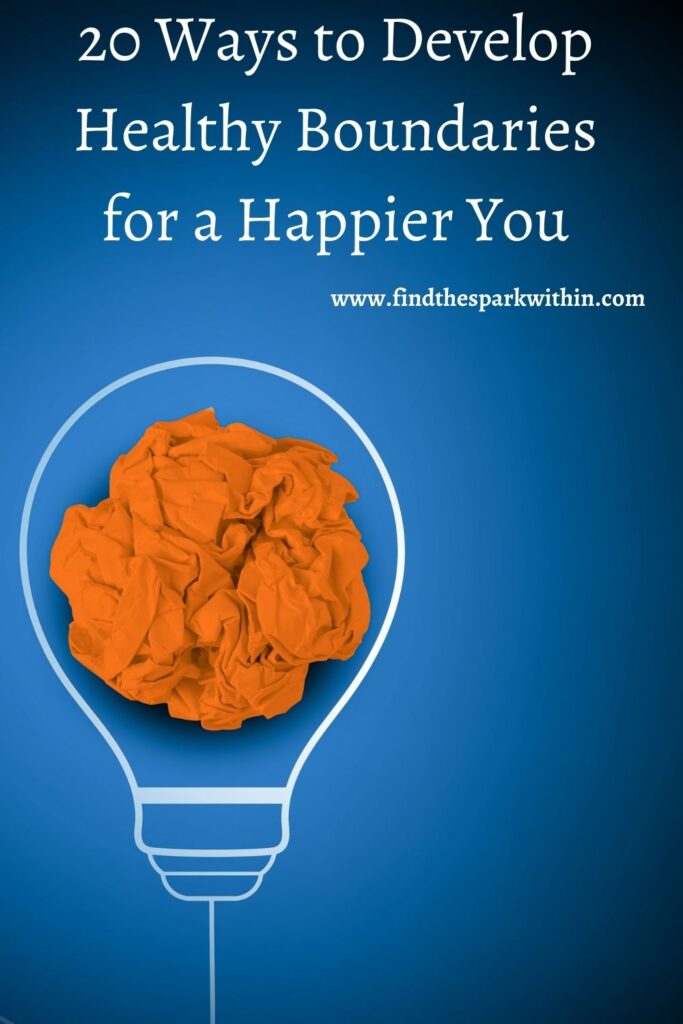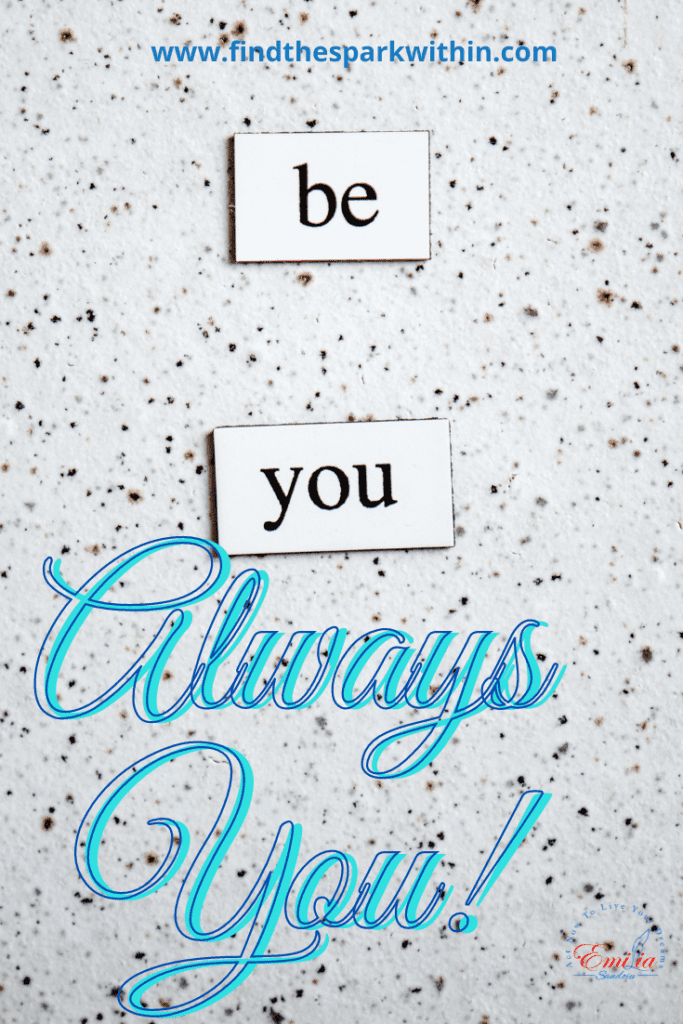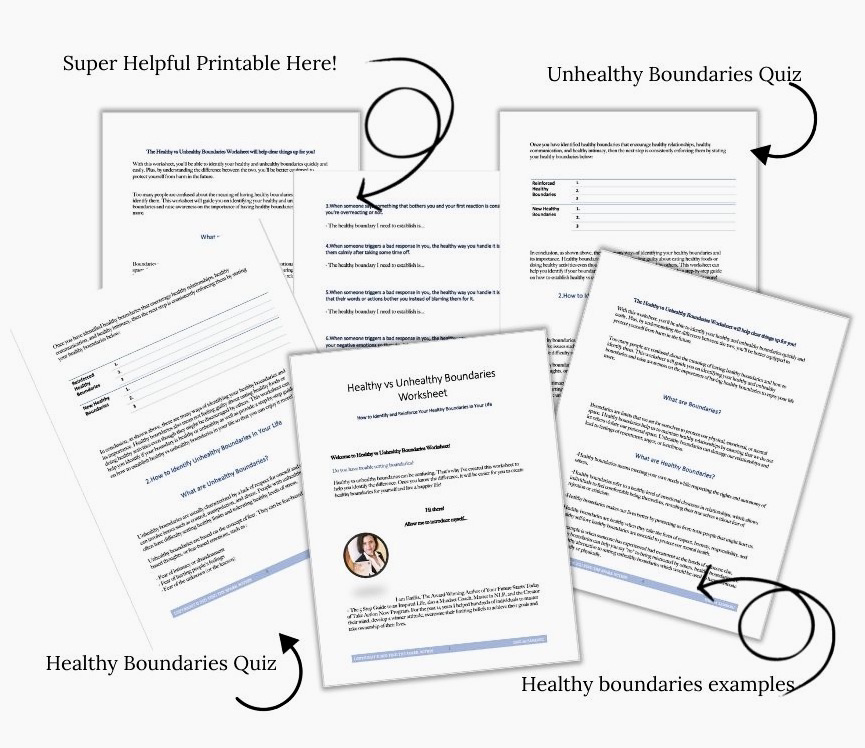20 Ways to Develop Healthy Boundaries for a Happier You
20 Ways to Develop Healthy Boundaries for a Happier is an article for anyone that is feeling stuck in a rut.
If you feel like you’re stuck in a rut, the 20 Ways to Develop Healthy Boundaries for a Happier You is your article! Millions of individuals are trapped in their old selves and want direction to live life to the fullest. If you find yourself in this category, keep reading!
As a result of practicing the principles outlined in this post, I’m going to show you how to overcome your fears and boost your confidence, allowing you to live a more purposeful life. So, are you ready? Let’s get started!
Don’t have time to read all now? Click Here to download the Healthy vs Unhealthy Boundaries Free Worksheet.
Everyone deserves to be happy and live life to the fullest. Many individuals, on the other hand, are restrained by their previous selves and don’t know how to break free. You’ll discover 20 methods for building healthy boundaries in this essay that will help you overcome your boundaries and boost your confidence. So, plenty to gain, keep reading!
Healthy boundaries define who you are and what you will or will not accept in your life. They’re critical for developing a sense of self-esteem, boosting confidence, and creating a more joyful existence. People who do not have healthy limits may become controlled by others, which can lead to low self-esteem, stress, and anxiety. You can regain control by building healthy boundaries.
The Problem of Not Having Healthy Boundaries

There are a lot of issues that can result from not having healthy limits. Not only does it have an impact on your social relationships, but it may also influence your own self-esteem and happiness. Let’s look at what you should know about building good boundaries and why they’re so essential for everyone!
According to a poll by the APA (American Psychological Association, 2017), most individuals do not have healthy limits. Problems can arise as a result of this, including:
– Relationship issues: When you don’t have established limits, it’s difficult to establish limits on what you’ll and won’t accept from others. This can lead to bitterness, disputes, and even abuse.
– Low self-esteem: People who don’t have strong boundaries may struggle to feel good about themselves. This is because they put other people’s needs above their own and frequently take on more than they can handle.
– Poor mental health: People who have weak boundaries are more likely to develop anxiety and sadness. This is due to their decreased capacity to deal with the demands of everyday life.
When you don’t have limits, it’s impossible to respect yourself and your needs. Because it’s typically mistaken for something else, recognizing this may be difficult.
For anybody stuck in a routine with no healthy limits, this post is for you if you feel that you are not good enough to live with purpose. This means that if you’re unsure about how you should live your life and what’s most important to you, there’s something here for you!
The Benefits of Developing Healthy Boundaries
“You get what you tolerate.”
Henry Cloud
There are several benefits to establishing firm healthy limits for everyone. When you establish healthy limits, you gain a sense of strength and self-assurance. You get the ability to rely on your own judgments and make better decisions for yourself.
However, in the case of romantic relationships, they might need to learn how to establish limits and stick to them. This can be quite beneficial in relationships. You will be happier and more satisfied with your life if you have good boundaries.
Setting healthy limits may be difficult. For many people, it feels as though they aren’t good enough as is, so establishing stronger boundaries might feel impossible. That is precisely why it’s such an issue.
Healthy limitations assist us in protecting our time, energy, and emotional health. They allow us to spend more time on what matters most to us while still maintaining contact with the people who are most important in our lives.

20 Ways to Develop Healthy Boundaries for a Happier You

1. Establish limits
“No is a complete sentence.”
Anne Lamont
Ways to help you build better boundaries include establishing clear limits, politely saying no, and making your needs a priority. For example, one of my college classmates used to be ashamed to say no to others and found it tough establishing limits on how much time she spent with them. As her grades have begun to suffer as a result, and she’s become increasingly overwhelmed, I’ve given her some advice and coaching pointers. She was able to say no politely and at the same time feel comfortable when she was asked to the next party while studying for exams. It helped her get high merit grades in exams, but it also emphasized the need for her to construct healthy boundaries.
2. Don’t be too hard on yourself
Here’s how to not be so hard on yourself when things go wrong by practicing self-care, for example, taking a break, going for walks, and engaging in activities you like. It’s important to notice how you talk to yourself. Self-talk is influential, hence, is wise to not let the negative voices to ruin your day and take over your life. For more tips on how to silence your negative voices , check more tips on my latest post on Best ways to silence your negative voices .
3. Determine the behaviours to establish healthy limits
Determine which behaviours or feelings prompt you to establish limits. I’ll show you how recognizing actions and emotions may assist you in establishing limits. Let’s assume that you’re someone who is incredibly irritated if your partner smokes cigarettes in your presence. In this instance, you’d need to establish a boundary by telling your partner they must smoke cigarettes elsewhere or in a different room. This will assist you avoid becoming angry and will also safeguard your health. Find out more why developing healthy boundaries and limits is important here.
4. Practice effective communication
Take control of your words and promises by learning how to communicate effectively. A lady I once coached had a problem being successful in her words. She would frequently make commitments to others but then find herself unable to keep them. We focused on identifying the circumstances and people that were making her feel overwhelmed, and then I helped her devise a strategy for dealing with those situations. We also practiced declining requests that weren’t essential to her.
5. Recognise the importance of your relationships
Recognise the importance of your relationships by believing they are essential and necessary, as an example with family members, friends, and co-workers.
Have you ever found yourself on eggshells when interacting with someone? This is because they haven’t established boundaries, which can lead to an unhealthy relationship. A healthy relationship needs healthy communication, trust, respect, and compassion. Avoiding toxic individuals will allow for relationships that are satisfying, healthy, and provide chances.
6. Practice self-awareness to master your emotions
When you’re feeling overwhelmed, it’s easy to become a people pleaser and say yes when you really want to say no. If the pressure continues, consider proposing an alternative time or seeking assistance. You can’t be responsible for other people’s happiness while sacrificing your own if you’re not truthful to who you are and set healthy limits. Is vital to know hot to practice self-awareness to master your emotions of feeling overwhelmed, pressurised to please others or guilty. To learn more on how to let go of any negative emotions, check my post on 8 Simple and easy steps to let go of negative emotions here.
7. Practice your communication abilities
Practice your communication abilities and learn how to communicate in a manner that is polite and empathetic, such as “I’m irritated and frustrated when you _____” or “When you ____, I feel _____.”
It’s not only an art, but also a skill to be able to express oneself. Learn how to communicate respectfully and compassionately by validating others’ emotions.
8. Just be yourself!
Stop thinking about what people think of you. It will allow you to take more chances, explore new things, and have a lot of fun. It’s ok to just be yourself!

9. Bond with your strong principles
Learn how to be trustworthy, dependable, and reliable through being on time, following through, and keeping promises.
10. Believe in yourself and stay true to yourself
Recognise that you can count on yourself to get things done by being honest with yourself and trusting in your own ability to succeed.
11. Stop your inner-critic
Be aware of how you treat yourself. Do you criticize yourself when things don’t go as planned? A client I taught stopped her self-criticism when she realized that she would be harsh on herself if she didn’t succeed at work or her kids didn’t conduct themselves as expected at home. She began treating herself with compassion rather than condemning herself, and instead of criticizing, she extolled herself for:
– Tending to new things,
– Taking excellent care of herself and keeping her limits and boundaries in mind.
12. Practice positive affirmations daily
Mantra to practice every day: “I have a right to defend myself! It’s all right to be oneself; I’m fine just the way I am!”
Positive affirmations are an amazing simple and free tool available anytime! You can practice them anytime, freely, out loud or in your mind.
Positive affirmations helps you to stay grounded in the present and enjoy your life every day. Find out how to stay grounded and present in the moment here.
13. Connect with your inner-self and energy
Take a step back and determine if the problem is yours or someone else’s when you’re feeling overwhelmed. Consider, for example, family members, friends, and co-workers.
14. Be kind to yourself and others
Learn how to be assertive by expressing your opinions, ideas, emotions in a straightforward manner without being aggressive. It would be appropriate to state “I was hurt when I heard you say ____” if you are angry with someone because they offended you with something.
15. Let go of other people’s expectations of you
Let go of other people’s expectations of you. I recall a customer who came to me for coaching sessions on how to establish limits with her family in order to feel more like herself. I assisted her in determining her unmet needs as a result of all the bending over backwards on behalf of others around her. She was able to say “No” when she needed time alone without interruption from others after I taught her.
Also, she discovered where there were unhealthy or inappropriate patterns in her life that needed to be changed – such as when people wanted to interrupt if it wasn’t an emergency – so we worked together on finding better ways to communicate without being overly harsh.
16. Recognise your feelings
Recognise that you have the right to feel how you feel. When you care about others, it’s natural to want them to be happy, but individuals frequently won’t agree with how you’re feeling or what you require. To learn more how to recognise your feelings and emotions check my latest post here.
17. Know when to stop and overcome your fears
Stop just when you know when enough is enough, and your relationships will stay strong. It will also aid in the prevention of future grudges.
I know how it feels to dwell with fears and struggle of standing up for yourself. I’ve been there, many times. Hence, I know from own experience and my clients’s that is possible to overcome fears! To learn more how to overcome your fears click here.
18. Identify your triggers
Identify the factors that cause you to overreact, then think about what you can do to avoid them in the future. If your trigger is abuse, consider taking a pause and assessing how much truth there is in the statement before reacting. Explain why you were hurt by their words or actions if it’s vital.
19. Speak up your mind
Communicate your limits confidently to others and don’t expect them to read your mind if you want individuals to be mind-readers and not communicate clearly enough, you’ll only end up frustrated and irritated.
20. Celebrate small milestones!
Celebrate small milestones along the way as you work on setting boundaries with yourself and others around you.

What to Take with You Today,
There are 20 different ways to develop healthy boundaries, and it’s a lot to remember; don’t worry if you can’t do them all at once. Just start with one or two that appeal to you and make a timetable for the following week to improve on them.
As you begin to see results, add more of these healthy boundary-building approaches to your routine. You’ll quickly discover that you’re living a happier existence with improved relationships and self-esteem.
If you want further information on how to set up healthy boundaries that are suited to your needs, book a Free Discovery Call with me Here.
It was a pleasure to share some of the finest 20 ways to develop healthy boundaries for a happier you with you!
Please share this article with anyone who could use some inspiration and assurance on having healthy limits and living life to the fullest every day!
I hope you found this information useful. If you’re searching for more methods to develop healthy boundaries and boost your self-esteem, I’ve got a freebie for you.
Download my Healthy vs Unhealthy Boundaries Free Worksheet below! Includes easy steps and tips to help you implement daily self-love and see results in just 20 days!

Stay Blessed because You Are!
Yours Sincerely,
Emilia x
Award Winning Author, Intuitive Mindset Coach and Creator of Take Action Program







Thank you for sharing so much knowledge and freebies!
You are welcome Elena Z! Stay tuned for more.